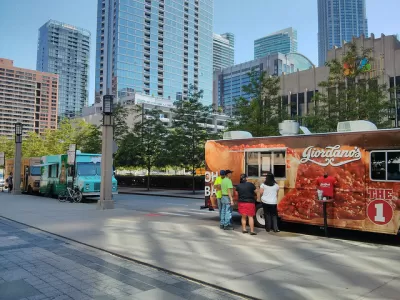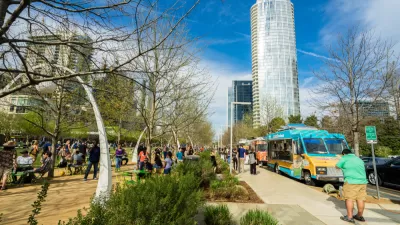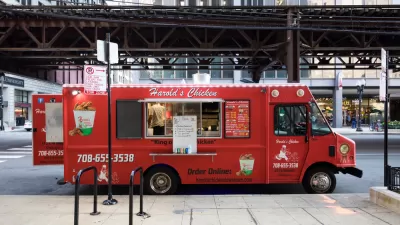In Chicago, food trucks are disappearing and some blame the city’s stepped up enforcement of regulations and fines.

In cities around the U.S., the food truck industry is growing. "In LA County there are currently 2,600 permits for food trucks; Minneapolis, where winters are harsher than they are in Chicago, has 80 to 90 trucks; and Washington, D.C., has 100, according to representatives of those cities' local food truck associations," Julia Thiel reports for the Chicago Reader. Those numbers contrast sharply with those of Chicago, where the city only supports 70 licensed trucks. That number is approximately half what the city had in 2012.
Gabriel Wiesen, president of the Illinois Food Truck Association, argues that the difference between Chicago and those other cities is regulation. In Chicago the laws "…prohibit the trucks from parking within 200 feet of any business that sells food (including convenience stores and pharmacies), and from remaining in the same spot for more than two hours," Thiel reports. These rules have become more difficult to coexist with since a 2012 report in the Sun Times criticized the city for its lax enforcement, which lead to a crackdown.
FULL STORY: Why Chicago’s once-promising food truck scene stalled out

Planetizen Federal Action Tracker
A weekly monitor of how Trump’s orders and actions are impacting planners and planning in America.

San Francisco's School District Spent $105M To Build Affordable Housing for Teachers — And That's Just the Beginning
SFUSD joins a growing list of school districts using their land holdings to address housing affordability challenges faced by their own employees.

The Tiny, Adorable $7,000 Car Turning Japan Onto EVs
The single seat Mibot charges from a regular plug as quickly as an iPad, and is about half the price of an average EV.

Toronto Condo Sales Drop 75%
In two of Canada’s most expensive cities, more condos were built than ever — and sales are plummeting.

Vehicle-related Deaths Drop 29% in Richmond, VA
The seventh year of the city's Vision Zero strategy also cut the number of people killed in alcohol-related crashes by half.

Seattle's Plan for Adopting Driverless Cars
Equity, safety, accessibility and affordability are front of mind as the city prepares for robotaxis and other autonomous vehicles.
Urban Design for Planners 1: Software Tools
This six-course series explores essential urban design concepts using open source software and equips planners with the tools they need to participate fully in the urban design process.
Planning for Universal Design
Learn the tools for implementing Universal Design in planning regulations.
Smith Gee Studio
City of Charlotte
City of Camden Redevelopment Agency
City of Astoria
Transportation Research & Education Center (TREC) at Portland State University
US High Speed Rail Association
City of Camden Redevelopment Agency
Municipality of Princeton (NJ)




























